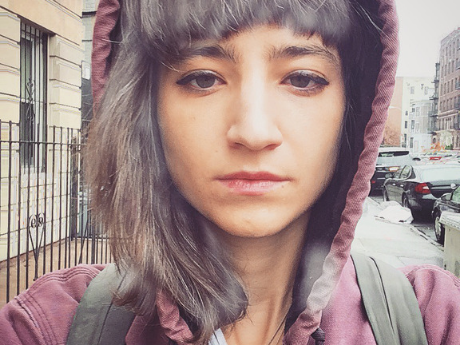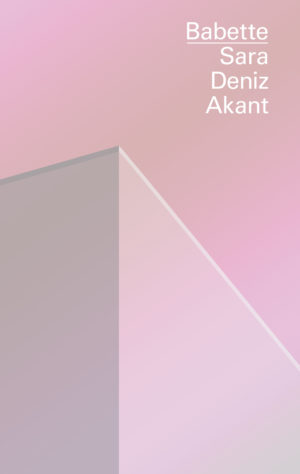In Their Own Words
Sara Deniz Akant on “S E P T I M A”

S E P T I M A
SHE who wipes my Atticus chamber – "hey Septima
dear, my dark heli-bug" – that's okay, I'm just sinking
in my little peeing-yard
this left-handed mass
was never authorized a place, stranger to itself
and to others on the isle I don't attempt the castle
– well that would be a waste, not only
of mine eies
but also of my cell, its structure-cleaning time
I'm the beast that wrote the note constantly
in the moment of its own act of becoming, forgetting
what it was when what it was was merely swamp – a hand –
a blunted mind of nothing but red aster – the bird-like
flesh of old saw dust
my hands
they decorate a dungeon
with a bunch of purple heather my hands are as empty
as the day I was born
just a network of organs
entangled in bone a small globe, your sphere – "hey
Septima, dear" – or what Septima took :
her mind, her glyph, her shore
All rights reserved. Reprinted with the permission of the author.
On "S E P T I M A"
SEPTIMA is interested in names, and she has changed her own a few times. At first, of course, a poem has no name—but when it finally acquires that object of language to signify an individual identity—that's when it really starts to become a poem. So for me, names and titles are an important part of the writing process: they help get to know a poem, a book, or a series, to let it grow into a real thing.
In the book Babette, Septima is actually Septimus—that's just what, as they say in the UK—she is "called." And she took that name from Virginia Woolf's book Mrs. Dalloway—which I was half-reading (as I tend to) on an island in Maine. But the name also comes from the depths of some larger associations: the serpentine belt of a car; the septic pool that may or may not have over-flowed. Why did the poem collect these dark and phallic themes? Was I thinking about how my father had buried my umbilical cord in our yard, an obscure Turkish tradition? About how he had gassed the gophers with a hose from the exhaust pipe of our car, how the neighbors had dug their own holes "all the way to China" next-door? At the same time, I'm almost sure our septic tank did in fact runneth ova.
But let's get back to the island, which is not not related to the yards and the cars. I wrote this poem while at a residency on that island in Maine. Everyone had their own cabin, and we would get wine-drunk at night—write or work through a low-grade hangover in the day. We all learned to share the bathroom in the communal house, which is to say I was literally peeing "in my little peeing-yard," sinking in over-sized boots and sticky island mud. And I started to feel all the strange group dynamics; to imagine this world in which one person—probably, as in a dream, always me— was becoming hated, or excommunicated, or "never authorized a place" from the start.
A few voices emerged in my head from this fantasy. I was already working with the self as a certain monstrosity in the book: "swamp" is the color that my mother always called my eyes, and the antiquated spelling of "eies" has become a playful meme or trope. Once on the radio I thought I heard someone say "my hands come back to me as empty of basketballs as the day I was born," an awkward phrase I'd been trying to fit into a poem for a long time. I was glad it found its home in Septima: in the triple-voiced self: the beast that writes the note against itself. One voice blames, controls, and chastises (the most frequent). One calls to duty (hey Septima, dear). A third speaks out in italics, and best-case scenario, takes back its mind, its rights—by the end.
Really, I might have titled the poem "Septimus, -a, -um," like in Latin, because there is not one single ending that seems perfect or just-right. That's a different project, but I like being able to change a poem even after it's published. If I had to make a symbol for Septima now, I would draw something that says "three"— voices, endings, poetic IDs… e.g.,
__^ ^ ^__
s e p t i m a 3



